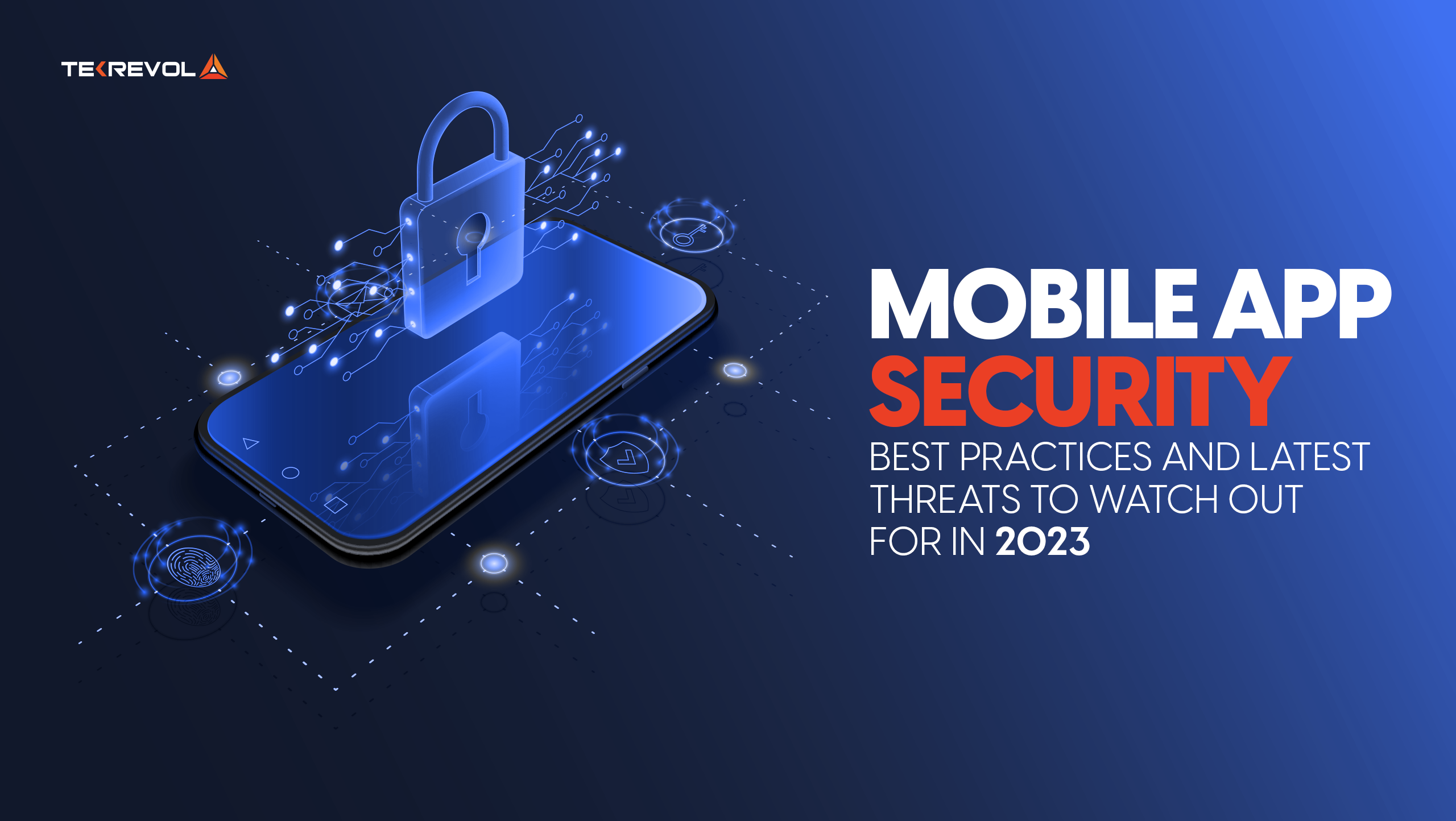Undeniably, mobile app development has gained significant momentum, especially due to the rapid progression in technology and the IT business world.
However, developing software up to a large extent/ or in bulk does not guarantee safety from hackers and other malicious entities.
Even though a simple and delicate mobile app can expose confidential business information. Ultimately leading to damage to your business reputation.
No wonder, with the increasing number of cyber-attacks and businesses falling victim to security breaches, mobile app security has become a crucial element.
Risks such as insecure data storage, communication, code, and encryption pose significant threats to mobile application development.
In order to protect your mobile apps from serious threats, such as against fraud, phishing, malware, and other unexpected attacks, it’s advisable to make use of high-quality tools and technologies to prevent danger.
In this blog post, we will shed light on hazardous mobile app security threats. Besides, we’ll cover some best practices that help to secure your mobile apps.
Ready to discover? Let’s roll on.
What is Mobile App Security?
When users engage in online transactions, they unknowingly leave behind a digital trail that includes their personal name, address, contact number, and banking information.
While this data enhances the user experience, it also makes them vulnerable to external threats if stored insecurely and inappropriately.
In other words, we can say that mobile application security refers to the proactive measures that are taken to safeguard applications from unauthorized access.
For instance, personal, financial, and confidential data. Therefore, prioritizing mobile app security beforehand is critical to alleviating potential risks.
To prevent any unfavorable circumstances later, it is better to comprehend and utilize authentic tools and technologies.
How Does Mobile App Security Benefits Businesses?

Being monitored by unknown entities or individuals can be scary, especially when it comes to work-related matters. However, for businesses, it is imperative to prioritize mobile app security best practices in order to avert any challenges later.
There are various reasons which portray the importance of mobile app security, especially in today’s fast-paced digital landscape.
Firstly, it not only protects the organization’s sensitive data but also enhances the user experience.
Secondly, it helps to maintain brand reputation and improves the brand’s presence online.
Thirdly, it minimizes the risk of data breaches or cyber-attacks.
Lastly, and most importantly, it helps businesses protect their confidential information.
All in all, by offering the preceding features mentioned above, businesses can effectively safeguard their customers’ information and foster trust and loyalty. Thus, resulting in long-term customer retention and satisfaction.
Some of the most common and popular reasons for implementing mobile app security practices are;
- A secure web browsing experience
- Device performance maintenance
- Real-time protection from threats
- Other security solutions
Protecting Your Identity and Data – Common Mobile App Vulnerabilities & Threats

As the popularity of mobile applications continues to expand, hackers have become increasingly adept at exploiting vulnerabilities, putting users’ data at risk. Ultimately resulting in identity theft, data compromise, or both.
Whether you’re a mobile app developer or a regular mobile user, it’s important to be aware of these threats in the first place.
Data Theft & Malware Attacks
One of the most serious threats that could arise due to the increasing use of mobile apps is data theft & malware attacks. They have become a serious concern for users and businesses alike, nowadays.
Mostly, cybercriminals often target mobile apps as it is an easy way to spread malicious code and steal personal information.
Apart from that, they also upload apps that entail malicious code, which ultimately results in spreading viruses into existing apps.
Henceforth, it’s essential for app developers and businesses to be vigilant and take necessary precautions to protect against malware attacks and data theft.
Unauthentic APIs (Application Programming Interfaces)
APIs play a decisive role in mobile app development, enabling apps to communicate and share data. However, third-party APIs can generate significant security risks.
The reason is that they may grant access to sensitive information that can be exploited by malicious activities later.
Besides, it’s essential to carefully examine and select secure third-party APIs tools for your mobile apps. Plus, verify their security measures, including a robust authentication system.
In order to safeguard against potential vulnerabilities and protect user data, it’s vital to use authentic APIs.
Overall, prioritizing API security is dominant in ensuring the security of mobile apps in 2024 and beyond.
Data Leakage
Data leakage is another serious security threat that can occur when mobile apps lack adequate security measures.
Poor coding practices, outdated software components, or unencrypted data storage can all contribute to data leakage.
Cybercriminals can easily gain access to sensitive information stored in an app’s database, even after the app is no longer in use or has been deleted.
In order to protect your data from serious threats, it’s essential to take robust security measures during your mobile app development company. For an illustration, include proper encryption, secure storage, and regular security audits to prevent data leakage and safeguard user information.
Poor Encryption
Encryption is also a challenging security measure that protects data by converting it into an indecipherable code, which can only be accessed with the right secret key.
However, not all devices have encryption enabled, leaving personal data vulnerable to hackers.
Even those apps that use encryption don’t reflect that they are free from human errors, as developers can make mistakes that hackers can exploit and take benefit from it.
Failing to properly assess the strength of encryption in your app can lead to severe consequences in the long run, such as intellectual property theft, code theft, privacy violations, and reputational damage.
In a nutshell, implementing robust encryption practices helps to safeguard sensitive data and maintain app security.
Unsafe Network Connections
Unsafe and unreliable network connections can also result in formidable situations later. Therefore, make sure your app communicates with servers securely by using encrypted connections.
Apart from that, it’s crucial to prevent hackers from accessing or modifying the data being sent and received. For that purpose, make use of standard security protocols to avoid any circumstances later.
The majority of the apps neglect this, which can result in data leakage and other security threats.
To summarize, check that your app uses strong protocols and encryption methods to protect the confidentiality and integrity of the data exchanged between your app and the server.
Overprivileged Apps
Overprivileged apps are also considered a serious peril. Thereby, it’s important to be cautious of apps that ask for multiple permissions than they actually need.
Some apps may request excessive permissions, which can make your data vulnerable to hackers.
Unnecessary permissions could give access to sensitive data or functions that can be misused. For example, a photo editing app asking for your contacts list access may result in data theft in later use.
Hence, it’s vital when you’re installing an app, make sure to review and grant only the permissions it truly needs to protect your data from potential exploitation by malicious activities.
Reverse Engineering
Reverse engineering is a real threat to mobile apps. It can expose how your app works and reveal sensitive information like encryption algorithms and source code.
Attackers can use this knowledge to modify your app’s functionality for nasty purposes.
Thus, it’s vital to have strong security measures in place to safeguard against reverse engineering and protect your app from unauthorized access or modification by hackers.
To sum up, keep your app’s code and functionality secure to ensure the safety of your users’ data and privacy.
- Feeling anxious about your mobile apps' security? Prevent app vulnerabilities by connecting with our app development experts.
Mobile App Security Best Practices – How to Safeguard Your Mobile Apps from Serious Susceptibilities

Mobile app security remains a persistent challenge, no matter how much secure and robust mobile apps you own.
In reality, the same tools used to develop cutting-edge apps can also be utilized by hackers to exploit vulnerabilities.
However, there are some security practices that most of the leading mobile companies employ to protect their apps.
These practices include regular security audits, thorough testing, keeping software and libraries up-to-date, and implementing strong authentication and encryption measures.
By following these best practices, we can fortify our mobile apps against potential security threats and safeguard sensitive user data.
Make Use of Server-Side Authentication
When it comes to multifactor authentication, it is required to ensure that authorization is granted on the server side after successful validation. That means if your app stores data on the client side, make sure that the encrypted data can only be accessed after successful credential validation.
Also, if you use persistent authentication or “remember me” functionality, avoid storing password data on the device and generate unique authentication tokens for different devices to enhance security.
Stay Vigilant While Using Third-Party Libraries
When leveraging third-party libraries in mobile app development, it’s imperative to be mindful of potential security risks.
For that reason, it’s recommended to thoroughly test the code before integration, limit the number of libraries used, and establish a policy on how to handle them.
By following these best practices, you can enhance mobile app security and mitigate potential vulnerabilities associated with third-party libraries.
Employ Cryptographic Algorithm
Cryptography has emerged as a crucial technique to safeguard networks and digital devices, nowadays.
Some of the Cryptography tools and techniques, such as key-based authentication, dockers containers, security tokens, and Java cryptography architecture, are leveraged by cybersecurity experts. These technologies help to fulfill mobile app security requirements and alleviate development risks in the long run.
Also, these tools are constantly evolving with the advent of emerging technologies like blockchain, AI, and IoT.
To prevent encryption-related breaches, avoid storing sensitive information, such as hard-coded keys and passwords on mobile devices. While iOS developers make use of code encryption to deter reverse engineering, it’s not foolproof. Thereby, it’s important to assume that attackers can decrypt client-side information at any time.
Proper key management is crucial, as even the strongest encryption algorithm can be compromised with poor key management.
In addition to that, avoid using deplored or disapproved algorithms and refrain from creating your own encryption protocols until and unless you are an expert in security systems.
Integrate High-Level Authentication Methods
In today’s digital landscape, with a massive number of users, robust security measures play the most important role in preventing security breaches.
Strong authentication, including personal credentials and passwords, is essential for accessing software. For that reason, encouraging users to create strong passwords can greatly reduce the risk of attacks.
Additionally, implementing the two-factor authentication adds an extra layer of security, providing notifications for suspicious login attempts and ultimately enhancing the overall system’s protection.
Leverage High-Quality Encryption Tools & Techniques
Encryption is a formidable security measure that renders data unreadable and unusable if stolen from storage.
For that purpose, it is vital to ensure that all data in your code is encrypted and updated time-to-time, as this fortifies the protection against unauthorized access.
Even the most prominent entities, like the FBI, encounter difficulties in deciphering encrypted data, making it demanding for hackers to acquire illegitimate entries.
Overall, by employing encryption, you add an extra layer of security to your data. Also, it can save your data from potential breaches. Thus, safeguarding sensitive information.
Implement High-Authorized APIs
As businesses rely on APIs to streamline their development process, it’s important to be cautious about their security.
Needless to say, APIs can be vulnerable to external breaches. Though, unauthorized APIs, or loosely coded ones, can unintentionally provide advantages to hackers. Therefore, in order to ensure maximum security, it’s recommended to centrally authorize APIs.
This helps in mitigating the risk of unauthorized access and protects sensitive data, safeguarding businesses against potential data breaches and reputational damage.
Rigorous Testing & Through QA
When we talk about the safety of mobile apps, the software testing phase holds utmost significance as it ensures that the software product meets all specifications and adheres to the mobile app security checklist.
However, post-deployment security vulnerabilities can cost clients and sometimes damages a company’s reputation, too.
To overcome this risk, software developers should engage an expert QA team to conduct functionality testing, penetration testing, and code review on new code.
Other testing methods like threat modeling, security scanning, and risk assessment should also be employed to eliminate unrecognized third-party malicious activities, which ensures the security of the software product.
In short, by performing rigorous testing and thorough QA, software developers can ensure that their mobile apps are secure, robust, and effective in protecting user data and maintaining the trust of their clients and customers
- Looking for a reliable app development business to help you protect your mobile apps? Let our app developers do wonders for you!
Why Choose Us for Your Mobile App Security Practices & Services?
We can comprehend how much it is crucial to protect mobile apps from hazardous susceptibilities. Thereby, at TekRevol, we prioritize mobile app security as a fundamental aspect of our development process.
Our team of expert developers takes a proactive approach to ensure software security, incorporating measures such as penetration testing and encryption, and performing regular testing.
Also, they make updates to safeguard apps against potential threats.
We are meticulous in using secure coding practices and carefully utilizing third-party libraries to prevent any vulnerabilities.
We also understand the importance of protecting data in transit to prevent MiTM attacks in client-server communication.
With our reputation for delivering highly-secure and reliable mobile apps, choosing TekRevol for your mobile app development needs is a wise decision for robust safety and security.
Bottom Line
We can’t neglect the fact with every passing day, people’s reliance on mobile phones continues to grow, thus making mobile app security and data protection crucial.
Hence, understanding the risks and implementing secure coding practices, continuous security testing, and positive user experiences are essential for mobile application protection.
By choosing TekRevol as your software partner, rest assured you’ll acquire premium-quality services in the long run.
Also, we can help you bring your mobile app security to the next level.
Our team of specialists can protect your mobile applications and provide ongoing technical support, leveraging our expertise and extensive portfolio of successful apps.

 2873 Views
2873 Views April 12, 2023
April 12, 2023









